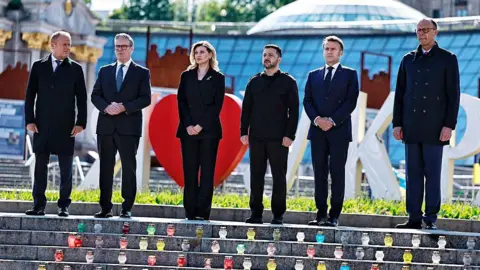Putin Under Pressure: How Ceasefire Demands Are Shaping Russia’s Next Move
Russia’s ongoing war in Ukraine has kept the world watching, but recent developments are putting Vladimir Putin in the global spotlight like never before. With mounting calls for an immediate ceasefire and new diplomatic efforts from Western leaders, the pressure on Putin continues to evolve. In this article, we explore how these demands are shaping Russia’s response and what it means for the future of the conflict.

European leaders met in Kyiv to discuss ceasefire pressure on Putin and Russia.
Ceasefire Demands Intensify
Western leaders are stepping up the pressure on Russia, urging Putin to agree to an unconditional 30-day ceasefire in Ukraine. A coalition consisting of France, Britain, Germany, and Poland recently met Ukrainian President Volodymyr Zelensky in Kyiv to reinforce this demand. According to the BBC, these leaders are warning of massive sanctions should Russia refuse the proposal. UK Prime Minister Keir Starmer emphasized, “All of us here together with the US are calling Putin out. If he is serious about peace, then he has a chance to show it.”
Planning and monitoring of the truce would largely be handled by the US and European partners. This marks a significant shift, as the international community moves to force clarity on Putin’s intentions regarding peace or continued aggression.
Strategic Challenges for Putin
The latest truce proposal comes at a complex time for the Kremlin. As detailed by CNN, the plan puts Putin in a position where he must choose to accept or reject the ceasefire, or risk exposing his true goals in Ukraine. Any move by Russia will be closely scrutinized. Either ignoring or violating the ceasefire could lead to heavier sanctions and increased Western backing for Kyiv.
Analysts say that these tactics are designed to test whether Putin genuinely seeks peace or aims to extend the war further. The next month will be critical, as Ukraine and its allies attempt to identify Putin’s real intentions.
Consequences and Global Reactions
While some Russian officials have expressed skepticism and accused the West of making contradictory and confrontational statements, the international coalition stands firm. The possibility of even more severe economic sanctions looms if the ceasefire fails. Meanwhile, sporadic fighting and accusations of breaches continue. Recent attacks in Ukrainian regions highlight how fragile the current situation remains.
The diplomatic effort aims to signal to both Putin and the world that Ukraine is not alone and that the stakes are higher than ever. The pressure on Russia is also fueling debate over broader strategies, such as threats of sanctions against critical sectors. For instance, European leaders have previously considered options like sanctions on Nord Stream 2 to leverage influence over Moscow.
What Lies Ahead for Russia and Ukraine
The next days and weeks are pivotal. Will Putin take the opportunity to pursue genuine negotiations, or will he opt for further escalation? The world is watching as Western unity and resolve are put to the test. Much depends on how Moscow interprets international pressure and whether it seeks peace or prolongs the conflict.
Conclusion: Will Putin Change Course?
As global leaders unite in their call for an end to violence, Putin stands at a crossroads. The mounting pressure marks one of the most decisive moments in the conflict so far. Whether Russia chooses to meet these demands or resists them will have profound consequences, not only for Ukraine but for European and global security. Observers around the world await Putin’s next move—and hope that peace will soon follow.
For more in-depth information, read the full BBC article on the coalition's ceasefire efforts or CNN’s analysis of Putin’s strategic dilemmas.